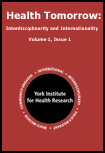Reproductive Inequality in Canada
DOI:
https://doi.org/10.25071/2564-4033.37274Abstract
This article will examine the implications of taking an autonomy approach to reproductive health policy and practice, and the value of shifting to an equality approach. In legal terms, the acknowledgement that reproductive control is often a s. 15 equality matter, not simply a s. 7 concern, could lead to drastically different health care services. The author will begin by explaining R. v. Morgentaler (1988), the case which set the precedent that reproductive health is a s. 7 concern—that is, an autonomy matter. The author will identify some current conditions in the context of reproductive health in order to illustrate the shortcomings to s. 7. Specifically, she will demonstrate the importance that government take positive action rather than uphold a position of non-interference. The subsequent section will make a case for redressing present conditions via the invocation of s. 15 equality rights. The author will conclude with an evaluation of s. 15, considering the objection that not even this section can guarantee positive action.

